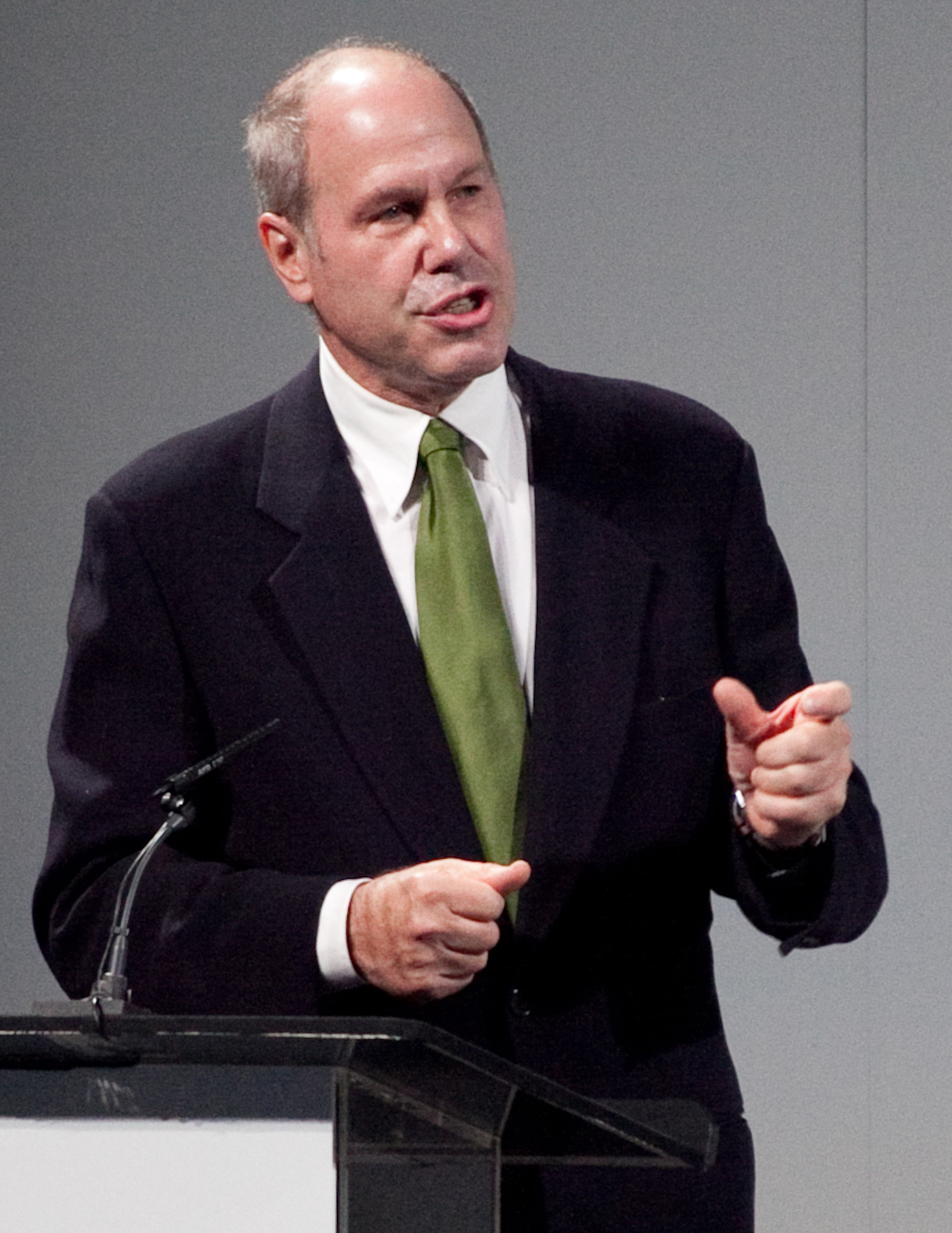
Michael Eisner
Michael Dammann Eisner (born March 7, 1942)[2] is an American businessman[3] and former chairman and chief executive officer (CEO) of The Walt Disney Company from September 1984 to September 2005.[4][5][6] Prior to Disney, Eisner was president of rival film studio Paramount Pictures from 1976 to 1984,[7] and had brief stints at the major television networks NBC, CBS, and ABC.
Michael Eisner
- Businessman
- media executive
- author
1966–present
The Walt Disney Company
Denison University[1]
The Tornante Company
- Sigmund Eisner (great-grandfather)
- Stacey Bendet (daughter-in-law)
Eisner's 21-year stint at Disney saw the revitalization of the company's poorly performing animation studios with successful films such as The Little Mermaid (1989), Beauty and the Beast (1991), Aladdin (1992), and The Lion King (1994), a period known as the Disney Renaissance. Eisner additionally broadened the company's media portfolio by leading the acquisitions of ABC, most of ESPN and The Muppets franchise. Eisner also led major investments and expansion of the company's theme parks both domestically and globally, including the openings of Disney-MGM Studios (now Disney's Hollywood Studios) in 1989, Euro Disney (now Disneyland Paris) in 1992, Disney's Animal Kingdom in 1998, Disney's California Adventure Park and Tokyo DisneySea in 2001, Walt Disney Studios Park in 2002 and Hong Kong Disneyland in 2005.
Eisner's final years at Disney were tumultuous: a string of box-office bombs in the early 2000s, public feuds with former associates such as Jeffrey Katzenberg and Steve Jobs, and dissatisfaction with Eisner's management style culminated in the "Save Disney" campaign organized by Roy E. Disney, during which Eisner rapidly lost the confidence of much of Disney's Board of Directors. As a result of the pressure from the campaign, Eisner announced in March 2005 that he would step down as CEO prematurely, handing day-to-day duties to Bob Iger before formally leaving the company in September 2005. He went on to create the stop-motion animated sitcom Glenn Martin DDS in 2009.
Early life and education[edit]
Eisner was born to an affluent, secular Jewish family[8][9][10] in Mount Kisco, New York. His mother, Margaret (née Dammann), whose family founded the American Safety Razor Company, was the president of the Irvington Institute, a hospital that treated children with rheumatic fever.[8] His father, Lester Eisner, Jr., was a lawyer and regional administrator of the United States Department of Housing and Urban Development.[11] His great-grandfather,[12] Sigmund Eisner, established a very successful clothing company that was one of the first uniform suppliers to the Boy Scouts of America[8] and his great-grandmother, Bertha Weiss, belonged to an immigrant family that established the town of Red Bank, New Jersey.[8] Eisner has one sister, Margot Freedman.[11]
He was raised on Park Avenue in Manhattan.[8] He attended the Allen-Stevenson School kindergarten through ninth grade followed by The Lawrenceville School in 10th through his senior year and graduated from Denison University in 1964[8] with a Bachelor of Arts degree in English.
[13] He is a member of the Delta Upsilon fraternity[14][15] and credits much of his success to his time at Keewaydin Canoe Camp for boys in Vermont.[8]
ABC and Paramount[edit]
After two brief stints at NBC and CBS, Barry Diller at ABC hired Eisner as assistant to the national programming director. Eisner moved up the ranks, eventually becoming a senior vice president in charge of programming and development. In 1976, Diller, who had by then moved on to become chairman of Paramount Pictures, recruited Eisner from ABC and made him president and COO of the movie studio. During his tenure at Paramount, the studio produced films such as Saturday Night Fever, Grease, the Star Trek film franchise, Ordinary People, Raiders of the Lost Ark, An Officer and a Gentleman, Flashdance, Terms of Endearment, Beverly Hills Cop, and Footloose, and TV shows such as Happy Days, Laverne & Shirley, Cheers and Family Ties.[13]
Diller left Paramount on September 30, 1984, and, as his protégé, Eisner expected to assume Diller's position as studio chief. When he was passed over for the job, though, he left to look for work elsewhere and lobbied for the position of CEO of The Walt Disney Company.[16]